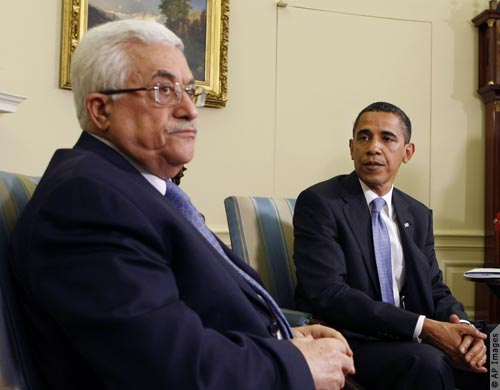
Photo Courtesy of America.gov
As the adage says, if you’re a friend to everyone, you’re a friend to no one. This seemed to be confirmed Monday when Fatah, the moderate Palestinian political party that controls the West Bank, distributed a memo saying that its support for President Obama “evaporated” after he bent to pressure from the Zionist lobby. But since Obama also drew Israeli criticism in June for opposing Israel’s construction of settlements in Palestinian territories in a Cairo speech, the Fatah statement comes as a surprise. The dominance of the hard-line American Israel lobby has receded in recent years and President Obama is widely seen as more supportive of the Palestinian Authority than his predecessors. So why the ire?
Upon closer examination, Fatah’s statement says more about Palestinian Authority President Mahmoud Abbas’ political capital than it does about Obama’s leadership. As the AP writes, it is unclear whether Abbas was even involved with the memo:
The memo comes at a time of turmoil within Fatah after Abbas quickly reversed a decision to suspend efforts to bring Israel before a U.N. war crimes tribunal in connection with the Gaza war.
The document, dated Oct. 12, was issued by Fatah’s Office of Mobilization and Organization. The office is headed by the party’s No. 2, Mohammed Ghneim.
It was not immediately clear whether the document reflects Abbas’ views or whether it was leaked to pressure Obama to bear down harder on Israel. Abbas’ aides had no comment and Ghneim could not immediately be reached for comment.
Abbas has drawn criticism for working toward peace with the United States and Israel without demanding enough from his Israeli counterparts. This week, Lebanon’s Daily Star ran an editorial demanding that Abbas step down, and a youth group in the Gaza Strip held a mock trial, prosecuting Abbas for “betraying the blood of the martyrs and the injured.”
This is certainly a setback for the already-tenuous Middle East peace process. Middle Eastern news sources continue to suggest a possible Third Intifada. Will Abbas make a politically risky statement supporting Obama, or differ to Fatah hard-liners and distance the party from its best chance in decades to foster an American ally? Stay tuned.














